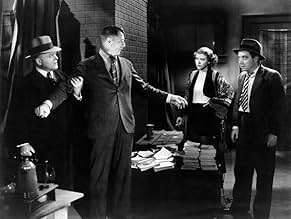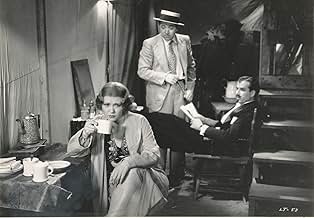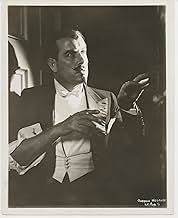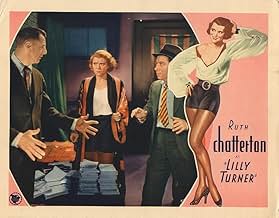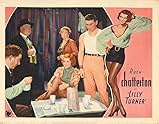Adicionar um enredo no seu idiomaA carnival magician deserts his wife when he finds out she's pregnant. She then marries the carnival's barker, but finds herself attracted to a young engineer.A carnival magician deserts his wife when he finds out she's pregnant. She then marries the carnival's barker, but finds herself attracted to a young engineer.A carnival magician deserts his wife when he finds out she's pregnant. She then marries the carnival's barker, but finds herself attracted to a young engineer.
- Direção
- Roteiristas
- Artistas
- Undetermined Secondary Role
- (cenas deletadas)
- Earle
- (cenas deletadas)
- Mrs. Flint
- (cenas deletadas)
- Earle Yokum
- (não creditado)
- Man in Carnival Audience
- (não creditado)
- Man in Carnival Audience
- (não creditado)
Avaliações em destaque
** 1/2 (out of 4)
Ruth Chatterton plays the title role, a woman who gets married but then loses her husband when it turns out he is already married to another woman. She loses her baby and then joins a traveling medicine show where she meets another man (George Brent) but her pass might catch up with her. Here's another Pre-Code from William A. Wellman but the screenplay doesn't do anyone justice. The performances are all very good with Chatterton really stealing the show as the tough as nails woman. Brent also turns in a fine performance as does Frank McHugh, Robert Barrat and Ruth Donnelly. The screenplay is full of cliché material from the wrong men falling for Lilly up to the ending, which anyone will see coming from a mile away. The bigamy plot twist might have been shocking for the day but it too is pretty watered down even for the era.
Leo Forbstein's jolly score is cleverly based on the old tear-jerker 'Till We Meet Again' and 'Spin a Little Web of Dreams' from FASHIONS OF 1934. That's one example of how Warners blended strains of tragedy into an upbeat tone. Despite the unmitigated misery of the story, weirdly the mood of this is positive and optimistic - well, as optimistic a Depression audiences could hope for.
Poor Ruth Chatterton marries an abusive bigamist, gets pregnant, loses her job, loses her husband, loses her home, loses the baby and ends up in poverty working in a carnival side show run by a sexual predator with just one friend who's s hopeless alcoholic. All of that's just the first fifteen minutes! ... then it speeds up! It's astonishing how much story is squeezed into an hour whilst still fully developing the characters. One example of how Wellman condenses superfluous plot to allow him to focus on character is when McHugh helps out his friend Lilly. To save her from the stigma of becoming an unmarried mother he marries her but this whole story is handled in about ten seconds. McHugh says: 'I'll see you alright.' Then we simply see a marriage certificate.
In the best tradition of a Warner early thirties melodrama, just when you think things can't possibly get any worse for poor Lilly...it does. It's like every cliché, every story and plot twist from every pre-code movie ever have been squeezed into one wild and wacky hour. Any pre-code fan must see this - it's like all your Christmas presents rolled into one.
One reason for watching early thirties pictures is because they usually star a sexy young lady like Joan Blondell or Claudette Colbert and I must confess that foolishly I wasn't going to watch this simply because Ruth Chatterton isn't on 'my list.' My shallow stupidity almost made me miss this near classic. Ruth Chatterton is (as I've now learned usually is) fantastic in this. She's just so real. Her naturalness and ordinariness makes her so completely believable - which is a real feat considering the story.
One reason I decided to watch this is because it's directed by William Wellman. He's not someone you'd associate with melodramas, he didn't really enjoy having to do this but his genius turns this absurdly over-the-top story into a totally absorbing grown-up drama. He really captures the seedy, shabby and unstable world these poor victims of The Depression are forced to inhabit. He truly transports you body and soul back to 1933.
And another reason to watch this is because Frank McHugh and Guy Kibbee have both got proper parts. McHugh isn't just the five minute comedy relief drunk, Kibbee isn't befuddled old 'Pop'. No, they're both superb actors here portraying genuinely realistic and believable actual living people.
Can't believe I nearly didn't watch this - it's exactly the sort of movie a pre-code fan like me loves.
It transcends the genre on many counts, though: Chatterton gives an excellent performance. I had to laugh when she gives her age as 22! Chatterton was 40 when this came out and 40, especially for women, was sort of the equivalent of 60 today.
Fine actress she was, whatever age she was passed off as. She gets excellent support here from peculiar collection of co-stars and supporting players. Frank McHugh is especially good as the alcoholic carnival worker who rescues her when she's dumped by a no-good new husband.
I was particularly impressed by the scenes with Robert Barrat. He was hardly an actor of Chatterton's caliber. He plays a strongman in the carnival run by Guy Kibbee. In his later scenes, the nature of which I will not give away, he is filmed in a manner highly reminiscent of German Expressionism. James Van Trees filmed the whole movie beautifully but these sequences are true knockouts. They'd be right at home in the very finest of film noir.
Be advised that some of the dialog exhibits racial and ethnic insensitivity that was acceptable at the time.
Poor Lilly, all I can say.
Ruth Chatterton was 40 passing as 22 when she starred in 1933's Lilly Turner. It's possible she met husband George Brent during the filming. The film also stars Frank McHugh. William Wellman directed.
This is precode. Lilly starts off married to an actor. Once on the train, he tells her vaudeville has no work for him. She winds up as his assistant for his magic tricks.
It's not much of a marriage. She finds friendship from a drunk on the circuit, Dave Dixon (McHugh). Her husband - who turns out to be a bigamist - disappears when Lilly becomes pregnant, so she marries Dixon, only to lose the baby.
She becomes the perfect female physical specimen for one of the acts; the male specimen Fritz (Robert Barrat) is in love with her. He turns out to be crazy and is institutionalized. His replacement is Bob Chandler (a mustacheless Brent), and he and Lilly fall in love.
I'm a fan of Chatterton's. I love the way she played these leading ladies past 40. She's wonderful as Lilly with all these men, including the carnival owner, crazy about her. She pulls it off. Wellman's direction is very good, with a few very noir scenes with crazy Fritz.
With the Great Depression in mind, Brent as an engineer who cannot find work is believable. More believable is attitude of the times, about responsibility. People's values were less self-centered. Just an opinion.
Você sabia?
- CuriosidadesWarner Brothers (which absorbed First National in November 1929) attempted to reissue Lilly Turner (1933), a pre-Code film, in 1936, but Joseph Breen denied them a Code certificate.
- Erros de gravaçãoWhen Lilly and Bob are in the truck, during the night at about 45 minutes into the film, David comes up from the bank and offers her a drink from his bottle. In one shot the label is facing her, in the next shot the label is facing away from her as Dave tried to hand her the bottle. When she drinks from the bottle, the label is facing away from her, but in the next shot as she finishes, the label is not visible. She goes to drink again and the label is visible once more.
- Citações
Doc Peter McGill: Folks, what is it that we all want? I ask you, what is it? Happiness! And you can't have happiness without health. And that's what I'm here to tell you about: health! And I can say without fear of contradiction, that if you follow the instructions in my little book closely, you'll never be sick again, as long as you live. Now, friends, before my assistants pass among you copies of this remarkable little book, I wish to introduce to you the most beautifully formed woman in all the world. Venus, herself, might envy her. A perfect specimen of womanhood! An amazing example of clean living and right thinking.
Lilly 'Queenie' Turner Dixon: Hello everybody. You may be surprised to hear that as a child I was deformed and practically a cripple. No one ever dreamed that one day I'd be well and strong. And I'm here to tell you that no woman should be discouraged with her figure, her face or her complexion. The truth is that thousands of tired, sick and overweight women have already proven that radiant health and a perfect figure can be acquired by following the instructions in Dr. McGill's Health book. I'm glad to have the opportunity to thanking Dr. McGill for my astounding good health. I thank you.
- Trilhas sonorasI Love You Truly
(uncredited)
Written by Carrie Jacobs Bond (1906)
Played and sung at the wedding by unidentified performers
Principais escolhas
Detalhes
- Data de lançamento
- País de origem
- Idioma
- Também conhecido como
- Os Amores de Lily
- Locações de filme
- Empresa de produção
- Consulte mais créditos da empresa na IMDbPro
- Tempo de duração
- 1 h 5 min(65 min)
- Cor
- Mixagem de som
- Proporção
- 1.37 : 1


